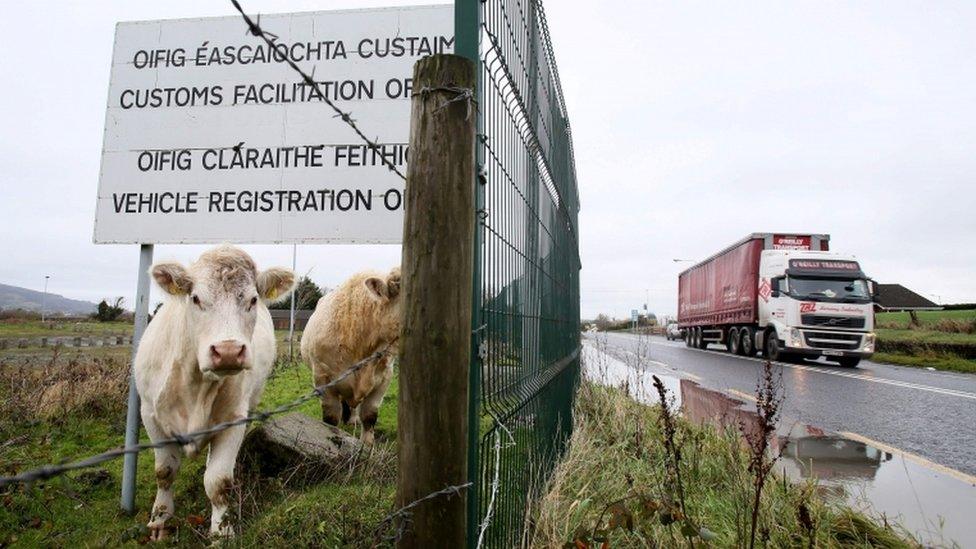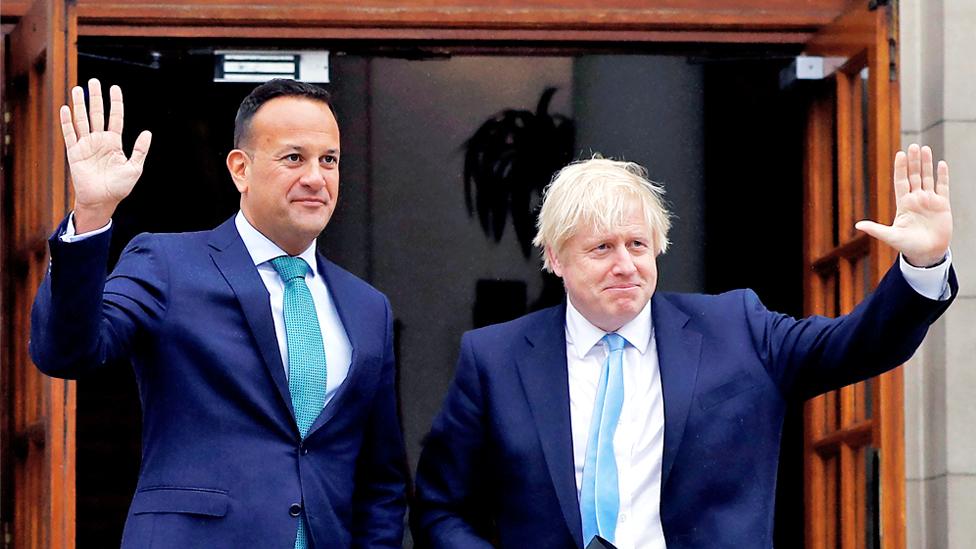Brexit: Doubts cast over Irish Customs plan
- Published

Boris Johnson had barely settled into Downing Street, when a minister dismissed his approach to Brexit out of hand.
The EU would refuse to negotiate on the terms outlined by the prime minister which had been pitched at a level guaranteed to fail, according to the minister.
"We are heading to no deal and an election," the minister told me in late July. "The EU won't negotiate on those terms."
Perhaps a grumpy pro-European minister might have been tempted to take a swipe at Johnson within days of his appointment as prime minister.
But this was a veteran Brexiteer. The minister's assessment was clear: replacing the Northern Ireland backstop with less formal arrangements would never fly in Brussels.
The minister's clear prediction has come to mind as EU sources make clear they will not be able to negotiate realistically on the basis of the UK's "non-papers" sent to Brussels in recent weeks. The papers will be upgraded to legal text later this week.
Tony Connelly, RTE's Europe correspondent, kicked off the latest round of Brexit war-gaming, when he reported on Monday night that the UK has proposed "a string of 'customs clearance centres' on both sides of the Irish border".
The centres, which would be located five to 10 miles from the border, would form the key plank of the UK plan to replace the Northern Ireland backstop.
The government is taking issue with the RTE report, suggesting the UK is not implying where checks should take place.
But this morning, the prime minister indicated some checks would have to take place on the island of Ireland because the UK must have a single customs territory.
Can a Brexit deal be done?
EU sources are withering about the UK proposals. One told me: "Their [the UK] idea for customs land checks are no different from what would happen in no deal."
The source sees little chance of a deal on the basis of the proposals floated by Mr Johnson's most senior EU adviser, David Frost.
"We have been told by people we take seriously that Boris Johnson wants a deal," the source told me. "But we do not see how a deal can be done."
The EU source then embarked on a dismissal of the UK's approach:
The UK wants to remove the Northern Ireland backstop and then use the transition period until December 2020 to negotiate the replacement to the backstop. But the EU has always said that without the backstop (or possibly an agreed replacement) there can be no withdrawal agreement. And without that, the transition falls away.
Claims that the UK is prepared to countenance elements of an all Ireland approach to agri-food are dismissed because the UK is "talking about alignment in some areas not on others".
The UK talks about the need to use technology and is honest that much of this is not ready, according to the EU. The source added: "But then they talk about apps. Dealing with these really complex areas through an app!"
The EU believes the prime minister has little interest in any of the substance in the "non papers". It believes he wants to hand all the issues relating to Northern Ireland to the devolved institutions, assuming they can be brought back to life.
Downing Street insists the prime minister is deadly serious about negotiating a deal - and giving some ground to achieve this.
One senior source says: "It is a case of us all lining up by the side of swimming pool. We need to jump together."
Other Tories, some of whom have not been traditionally well disposed to Boris Johnson, also believe he is genuinely trying to secure a deal.
But that Brexiteer minister, who harboured doubts from July, is not budging.
A few weeks ago, the minister was even more dismissive: "Boris is not going to get a deal done by 31 October. I don't see this all Ireland stuff working. It doesn't deal with tariffs, it deals with goods.
"We've been round this block before with the EU. The EU is saying nice noises now. But are they really going to sign up to something that doesn't deal with such fundamental elements as goods and tariffs?"
And perhaps now the EU is not saying such nice things.
You can watch Newsnight on BBC Two at 22:30 on Thursday. Catch up on iPlayer, subscribe to the programme on YouTube, external and follow it on Twitter, external.
- Published9 September 2019

- Published11 October 2019

- Published18 July 2019
